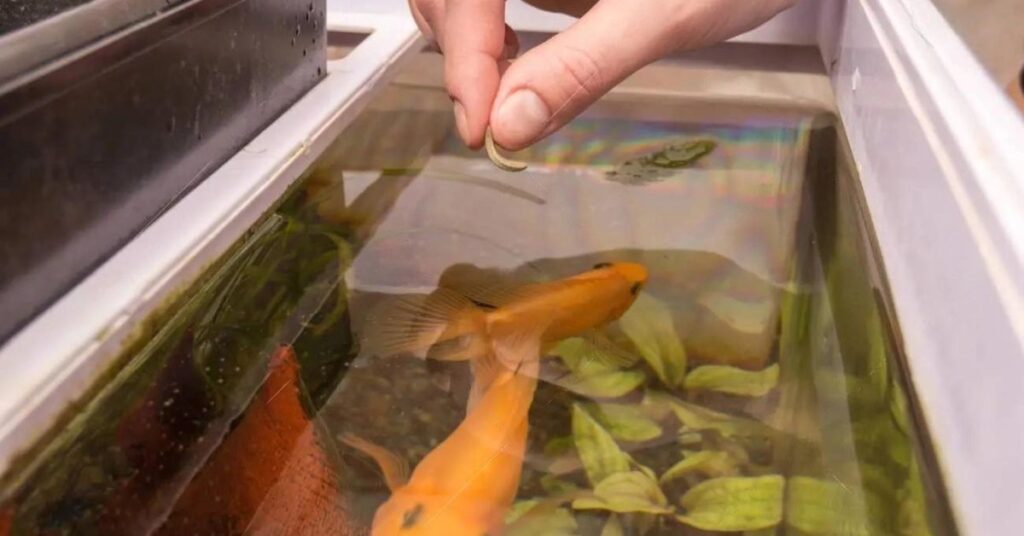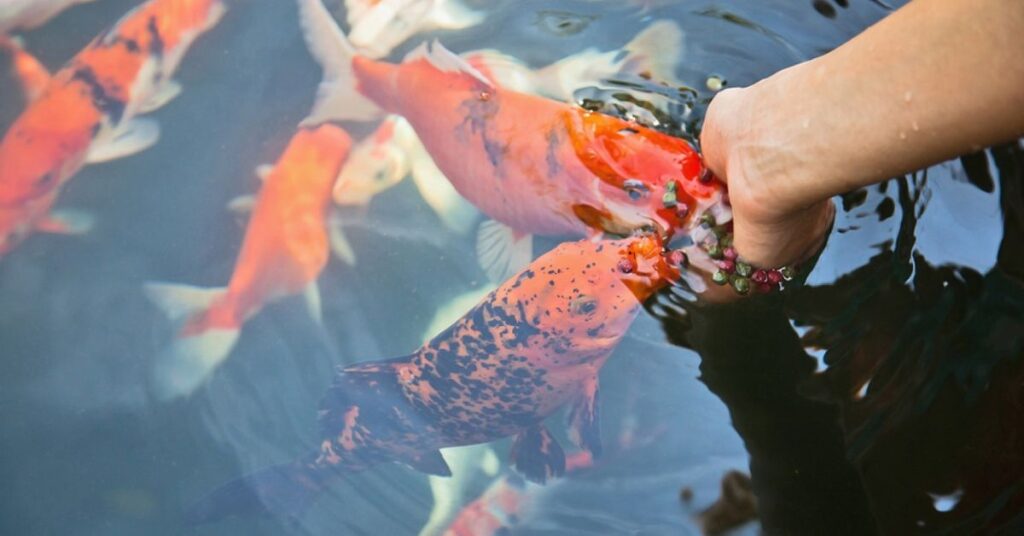What do goldfish eat? This is a question that many people who want to keep goldfish ask. Goldfish eat various things, including algae, insects, crustaceans, and small fish, while in their natural habitat, but when kept as pets, they can be fed commercial food, live food, and vegetables.
Goldfish eat both plant and animal matter, which means they are omnivores.
Goldfish are common aquarium fish that can live long if cared for well. The food that goldfish eat is one of the most vital parts of taking care of them. To stay healthy and avoid health problems, goldfish need to eat a healthy goldfish diet.
In this guide, we’ll talk about what goldfish eat, how much to feed them, and how often. You will also learn how to pick the best food for your goldfish.
What Do Goldfish Eat?
When kept as pets, goldfish should be fed a diet of various foods, including commercial food such as flakes, pellets, freeze-dried food, and granules. Goldfish should also be fed live food and vegetables.
Goldfish are omnivores, meaning they consume both plant and animal matter in their diet.
In their natural environments, goldfish will consume a wide variety of foods, such as algae, insects, crustaceans, and even small fish.
Goldfish are opportunistic feeders that can feed anytime they come across what they can eat. Still, care must be taken to control what they eat because the more goldfish eat, the more they produce waste which can change the quality of the water they are kept in and result in health issues.

Commercial Fish Food
A wide selection of different commercial foods may be given to goldfish. Commercially available Fish food you can buy in stores is made to meet the nutritional needs of goldfish.
These foods are available in several different forms, including flakes, pellets, and foods that have been freeze-dried.
Pellets: Goldfish are often fed food that is based on pellets. Thus, this type of diet is a standard option.
Pellets for goldfish, which can sink or float, are rich with vital nutrients and come in various sizes to meet the various mouth sizes of goldfish.
Pellets are an excellent alternative to flakes. They are less messy and less likely to pollute the water. However, pellets can be more expensive than flakes.
Flakes: Goldfish typically consume flake food, which is the most popular form of food.
Flakes are not difficult to locate and are relatively cheaper. However, flakes are notoriously tricky to clean up and, if not consumed in their entirety, may pollute the water. Because they are not heavy and can be seen floating on the water’s surface, goldfish find it much simpler to ingest them.
Flakes can be found in many distinct kinds, each providing a unique combination of nutrients.
Granules: Granules are small, compressed particles that sink slowly, allowing goldfish to feed at various depths.
Fish food granules are also known as pellets. They are an acceptable substitute for pellets as well as flakes.
Freeze-dried: Freeze-dried Food is an excellent choice for selective eaters of goldfish. Freeze-dried food retains most of its nutritional value while also being convenient to keep.
Live Food
Goldfish may get a lot of the nutrients they need from still-alive food. Live food for goldfish also has the potential to help stimulate their innate instincts for hunting. They are a source of natural food for goldfish.
The following are some examples of frequent forms of live food that goldfish consume:
- Brine shrimp
- Bloodworms
- Daphnia
- Mysis shrimp
Fresh Vegetables
Goldfish need vegetables because they are an excellent source of the vitamins and minerals that their bodies need, and they can also contribute to the cleanliness of the water in your aquarium.
Some common vegetables for goldfish are as follows:
Leafy greens: Goldfish can take in a variety of leafy greens, including spinach, lettuce, and kale, among others.
If you want your goldfish to eat these vegetables quickly, you should either blanch them or cut them very small.
Peas: Goldfish can benefit significantly from consuming peas that have been cooked and peeled due to their high fiber content. To prepare the peas, mash them or break them into small pieces.
Carrots: Goldfish can occasionally consume carrots that have been finely grated or cooked in the carrots’ complete form. Carrots are an excellent source of valuable nutrients and can contribute to improved coloring.
Insects and Invertebrates
Mealworms: Mealworms are a source of nutrition for goldfish, and they like snacking on the smaller mealworms. These dried insects are easy to find and offer a different dietary variety and natural food for goldfish. They are also widely available.
Earthworms: Earthworms are meals that are a natural source of protein that may be fed to goldfish, whether fresh or frozen. Before being fed to the animal, they can be cut into smaller pieces.
Shrimp: As a tasty treat, goldfish might enjoy nibbles of shrimp cut up into smaller pieces. Shrimp are an excellent source of the many proteins the goldfish diet requires.
Supplementary Foods for Goldfish
Supplemental foods can be given to goldfish in addition to their primary diet to provide them with more variety and help meet the balanced nutrition for goldfish. Fruits
Oranges: On occasion, goldfish can be given a few bite-sized pieces of an orange that have been peeled. Oranges are an excellent food choice for their high vitamin and mineral content.
Apples: Apples that have been shredded or finely cut up can be a tasty and nutritious treat for goldfish. Before using, make sure the seeds and the core have been removed.
Bananas: Bananas that have been mashed might be offered as a snack every so often. They have a high potassium content and are full of naturally occurring carbohydrates.
Treats and Snacks
Goldfish-specific treats: Snacks produced exclusively for goldfish. Pet stores carry a variety of snacks that have been developed with the goldfish’s dietary needs in mind. These critters’ dietary needs were considered when formulating these treats.
Homemade treats: If you have some gelatin and pureed veggies or fruits, you can make some tasty treats for goldfish at home. You can make healthful treats that are specifically suited to the tastes of your goldfish by following straightforward instructions.
How much to feed goldfish
Portion control:
Limit the amount of food you give your goldfish to the point where they can finish it in a few minutes. Excessive feeding might result in digestive disorders and concerns with water quality.
The food should be added to the tank in very few pinches over about a minute, and you should never add more food than your goldfish can consume in that time to avoid overfeeding goldfish.
You should not leave food in the tank or aquarium after feeding your goldfish; the food will get stuck in your filter and decompose, which will cause the water in your tank to become contaminated. As a result, you ought to throw away any food not consumed following the feeding session.
Frequency of feeding:
Goldfish should be fed no less than twice each day. Overeating can be avoided by dividing the total daily portion into several smaller meals throughout the day.
The feeding schedule for goldfish should be twice or three times a day, but each feeding should only consist of an extremely small amount.
If you maintain the temperature of the water at a low level, then your goldfish should consume even less food than this.
The metabolism of your goldfish will slow down when the water temperature drops, which means they will require less food than they would if they were kept in warmer water.
Avoid overfeeding:
Do not overfeed your goldfish: Goldfish tend to continue eating even when they do not feel hungry. To avoid obesity and the health issues that come along with it, it is essential to refrain from overfeeding, which is a common mistake in goldfish feeding.

How long can goldfish live without food?
The average goldfish can go without food for two weeks. It’s best not to go too long without feeding them, though.
If you traveled for two weeks or less, you can probably get away with not feeding your goldfish. But if you will be staying away for a more extended period, it is best to ask a friend or neighbor to assist you while you’re away to feed your goldfish but make sure they know how to do it properly first.
What You Should Not Feed Your Goldfish
Some foods should never be given to a goldfish, and these are the ones to avoid:
- Bread
- Crackers
- Cereal
- Cooked pasta
- Rice that has been cooked.
- Potatoes
- Onions
- Garlic
- Citrus fruits
- Products made from dairy animals
- Meat
- Fish
- Eggs
- Foods high in salt
- Sweet foods
- Spicy cuisines and dishes
- Foods that are past their expiration date
There are many different reasons why goldfish should avoid consuming these foods. Bread and crackers, for example, are foods that are low in nutritional value and could lead to your goldfish becoming malnourished.
Goldfish are susceptible to the toxicity of other foods, including onions and garlic. Other things, including meat and eggs, might cause the water in your aquarium to become polluted, endangering your goldfish to life.
It is always better to consult with a veterinarian or an employee at a pet store if unsure of a suitable goldfish diet. This will ensure that your goldfish remain healthy. They can advise you on the best foods to give your goldfish to ensure they remain healthy and content throughout their lives.
Conclusion
With this guide, “What do goldfish eat?” you would agree that goldfish must acquire nutrition from various sources, including commercial food, live food, and vegetables, to maintain their health. Proper goldfish feeding guidelines should be followed, which include refraining from overfeeding goldfish, providing food for them at the appropriate times throughout the day, and staying away from foods that could be dangerous. You should not forget to put an emphasis on the water quality.
You can ensure that your goldfish have a long, healthy, and happy life by providing them with the necessary nourishment.
If you find the guide helpful, kindly subscribe to the Pet and Homestead newsletter below.
You may also like: How Long Do Goldfish Live?

